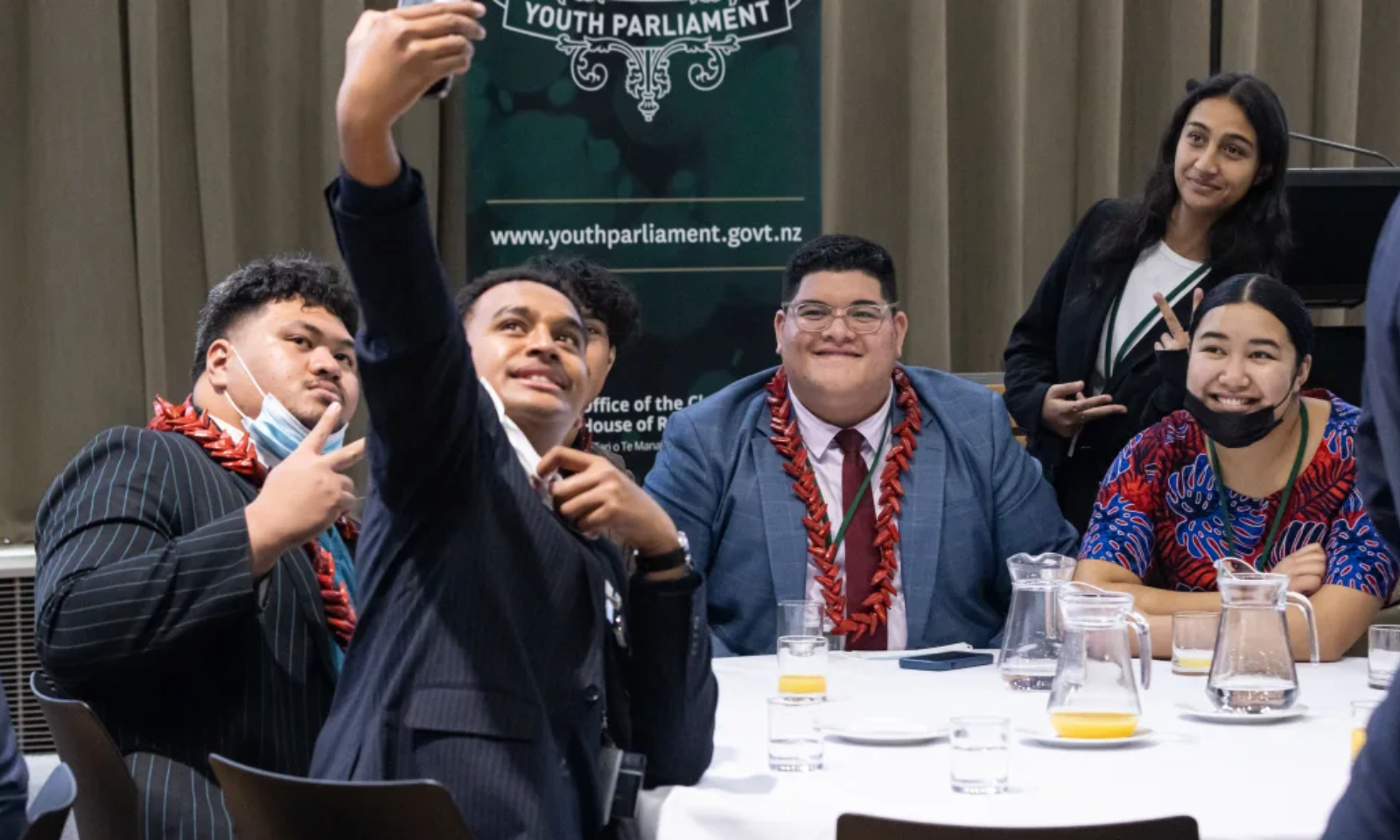

Kaiata Kaitao, Youth MP for Green Party member Teanau Tuiono, says more needs to be done to engage young people's passions.
Photo/PMN Composite/RNZ/Ministry of Youth Development
Rangatahi rising: Advocates call for urgent action to empower youth
In the wake of Budget 2025, concerns have been raised about the future of Aotearoa’s young people in education, KiwiSaver, and welfare reforms.


Major court case begins in Fiji: 4.15 tonnes of meth seized amid rising Pacific drug concerns

Pacific leaders push for global governance at UN ocean summit

‘Long overdue’: Pacific voices welcome $4m Cannons Creek library


Major court case begins in Fiji: 4.15 tonnes of meth seized amid rising Pacific drug concerns

Pacific leaders push for global governance at UN ocean summit

‘Long overdue’: Pacific voices welcome $4m Cannons Creek library
A Pacific Youth MP says the Government has not done enough to support young people positively in Budget 2025.
Kaiata Kaitao, Youth MP for the Green Party member Teanau Tuiono, is focussed on addressing ongoing issues in Pacific education at Youth Parliament 2025, which is scheduled for July.
She is one of a record–breaking 18 Pasifika representatives attending Youth Parliament, which includes 15 Youth MPs and three Youth Press Gallery members.
Speaking to Khalia Strong on Pacific Mornings, in a series highlighting the Pacific voices at Youth Parliament 2025, Kaitao expressed apprehension about whether the government’s Budget 2025 support measures would lead to positive outcomes for Pacific and young people.
She is particularly concerned about the impacts of the government's revisions to benefit eligibility for 18 and 19-year-olds on Pacific youth, especially those from unstable home environments.
“I worry for young people in particularly dangerous household situations with the parental tests. As time goes on, we'll see how it continues to affect young people,” she says.
The 17-year-old Head Girl of Tamatea High School in Napier says her Cook Islands-Māori heritage influences her approach to leadership.
“My culture and our cultural practices shape the way I look at things [and] the way I approach what having a seat at the table means,” Kaitao says. “It reminds me how important it is to not take things for granted.”
To prepare for the event, youth MPs undergo a months-long training programme facilitated by the Ministry of Youth Development. The programme engages them with parliamentary processes and creates networking opportunities.
Watch Kaiata Kaitao's full interview below.
Kaitao says that the passion and energy driving rangatahi to effect change is both enduring and palpable among the Youth MPs.
“It's something I've always known, but it's great to see it in practice. I'd really like to see it continue,” she says.
In his reaction to the Budget, community leader Pakilau Manase Lua told Strong: “Youth have been hit, and we have a disproportionately higher number of young people.
“That's going to impact us a lot more. And the messages we're giving our young people are, look, just hang tight. Something will happen, but not now.”
Pakilau highlighted the challenges young people face in communities with high unemployment, particularly among those non-Pākehā.
He criticised the government’s lack of encouragement for youth to find work or start businesses during difficult economic times, suggesting that such expectations are unrealistic.
Watch the Budget panel of business executive Sarah-Jane Elika, community leader Pakilau Manase Lua, and PMN political reporter Ala Vailala below.
“It's a good thing to encourage young people to not go on the dole, but there's not a lot of opportunities out there for work if there's high unemployment. So what are they going to do? And again, this is kind of the crosshairs on our communities.
“We have a disproportionately higher number of young people than Pākehā. This is a government that's kicking a dog while it's down. On one hand, they're saying, go and get work, go and set up a business, but this is the hardest time to do all of that stuff.”
Pakilau warns that without opportunities, young people may turn to gangs, criminal activities, or drugs.
He adds that the government’s focus on more affluent areas while neglecting struggling communities implies that this neglect leads to adverse outcomes.
Deputy Labour leader Carmel Sepuloni says while targeted education support for year 9 and 10 Pasifika is welcome, it doesn’t go far enough to acknowledge the disproportionate levels of hardship Pacific households are experiencing.

Pacific Youth MPs in 2022: From left, Trinity Kapeli, Epeli Ofe, Fano Asiata, and Edna Fonua. Photo/RNZ/Phil Smith
“If the families of these kids are struggling with housing, if their parents are out of work or being paid poorly, it has a massive impact on our kids' ability to be able to get on with their education.
“There's a little bit of money in there for education for Pacific [peoples], but it doesn't cover off the areas that I think our community would say would be priorities,” she says.
The reduction of KiwiSaver contributions from $521 to $260.72, including an increase in the minimum employer contribution rate from three per cent to four per cent, is a setback for Kaitao and her peers in their pursuit of a first-home deposit and retirement savings.
“It's concerning that the only massive amounts of funding I've seen towards youth have been for negative aspects. What we need is for classrooms to be able to engage students in their own interests, to push them onto their own journeys instead of trying to push them straight into work,” she says.
Sepuloni says KiwiSaver changes will hit Pacific people the hardest. According to the Labour Party, an 18-year-old starting KiwiSaver today would retire with $66,000 less under the new policy.
Watch Carmel Sepuloni's full interview below.
“We've got a very young demographic. The Pacific demographic is one of the youngest, alongside Māori in this country. This is a generation that's going to be born into the KiwiSaver scheme and has the opportunity to save properly for their retirement.
“It ends up being quite a significant loss down the track. It is contradictory, given that the government have said, ‘Okay, we want you to save more because it's important’,” Sepuloni says
Kaitao says there is a need to address tangible community-based issues to foster greater youth participation in democratic processes.
Kaitao says the Toitu Te Tiriti movement was pivotal in increasing youth engagement in her community.
“I saw friends who struggled to speak up in class give speeches on the march. I saw, for once, rangatahi standing up for what mattered, and friends working on government submissions when they'd never before taken part in the parliamentary process.

Elika Consulting Group Director Sara-Jane Elika highlights the disproportionate effects pay equity changes will have on Pacific communities. Photo/Elika Consulting Group
“We have to bridge that gap to make sure that they understand that this is the way that we help young people,” she says.
Sarah-Jane Elika, the director of ECG Consulting Group, was on a panel discussing the Budget’s impacts on Pacific communities, and told Strong that the pay equity legislation has saved $3.2 billion but would disproportionately affect the women already earning the least.
"So the data sort of addresses the question that there were already inequities before the legislation changed. This legislation genuinely would have helped alleviate a lot of those claims, particularly where Pacific women are in low-income employment. I'm all about looking at the positives that have come out of that,” she says.
Watch the Budget panel of economist Filipo Katavake-McGrath, Salvation Army policy analyst Ana Ika, and PMN political reporter Ala Vailala below.
Elika highlighted the government's investment in skills development boost, and says young people should pursue skills-based training as the government provides more pathways to enter such programs.
"Where has that money been redirected? For our Pacific community, the youth and skills development boost is where some of that spending has gone.
“So, we need to encourage our young people, 17, 18, 19, 20-year-olds, to use the opportunity to get into skills-based education and training because that's where our mum's working dollar has gone."